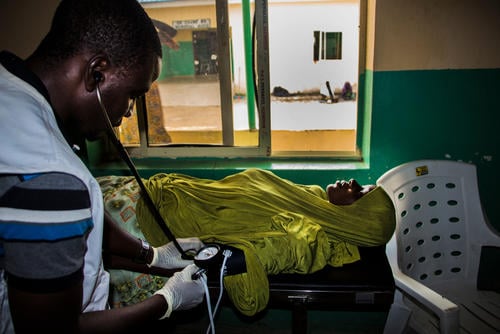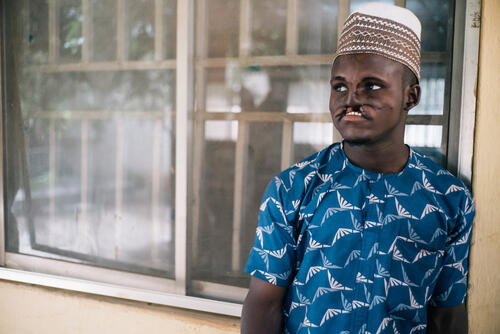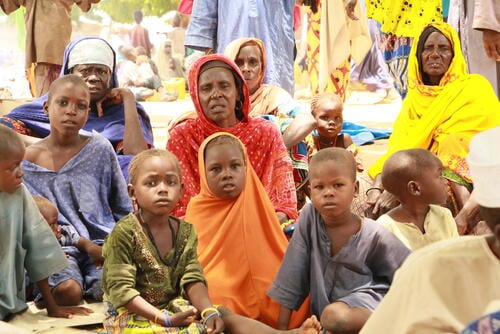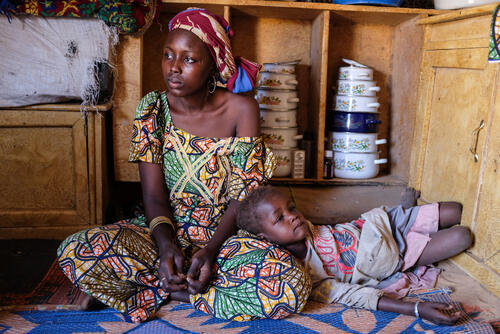The humanitarian context in Borno state
Nine years of conflict between the Nigerian military and armed groups in northeast Nigeria has taken a heavy toll on the population with serious humanitarian consequences. According to OCHA, more than 1.7 million people are internally displaced in the northeastern states of Borno, Adamawa and Yobe. Of these, 78 per cent are living in Borno.
Although the provision of humanitarian assistance has improved, services remain inadequate as security and access issues restrict the delivery of aid. Hundreds of thousands of people remain heavily dependent on aid for their survival. In some places, people have been stranded for over two years with little prospect of returning home.
MSF is providing medical care in several locations in Borno and Yobe states. Needs are particularly acute in isolated enclaves outside the Borno state capital, Maiduguri. Any disruption to the provision of assistance in these areas could have deadly implications.
People from across Borno state, as well as refugees from neighbouring Cameroon, continue to arrive – not always by choice – in towns controlled by the military. They have limited freedom to move outside these areas and are dependent on humanitarian assistance to survive. The basic amenities in many towns are already overstretched. Aid needs to be scaled up in these places to reduce health risks to new arrivals and existing populations.
There are parts of Borno and Yobe that we have not been able to reach. We have little information about the needs in these places, and as a medical humanitarian organisation remain concerned about the people living in those areas.
MSF medical priorities and responses
- We are providing vital medical care to vulnerable people, including pregnant women. Our teams are running nutrition programmes for malnourished children, providing mental health support, responding to disease outbreaks and providing emergency paediatric care.
- Although the nutritional situation has generally stabilised in Maiduguri, due to a massive deployment of aid, vulnerable pockets remain.
- Access to adequate nutrition is more precarious in isolated enclaves, such as Pulka and Rann. Freedom of movement is restricted, which makes farming and fishing difficult, meaning the population is heavily dependent on humanitarian assistance. MSF provides medical aid in these isolated locations, either through permanent health facilities or frequent visits by mobile medical teams.
- Water and sanitation facilities remain inadequate in several locations. There are severe water shortages in Pulka and Gwoza, where our teams have treated an increasing number of patients suffering from waterborne diseases and skin infections. The approaching rainy season will likely bring a spike in malaria and illnesses linked to poor living conditions, in locations like Rann, Banki and Ngala.
Summary
A huge population dependent on assistance
Hundreds of thousands of people remain heavily dependent on humanitarian aid for survival. An increase in the provision of aid has brought relief to accessible areas, but any breach of humanitarian assistance could have devastating consequences.
Some fragile gains, but the emergency is not over
Despite a massive deployment of humanitarian aid, there are still vulnerable pockets, even in Maiduguri. Access to food, water, shelter and medical care remains much more precarious in isolated enclaves like Pulka, Gwoza, Bama, Banki and Rann, which remain under the control of the military. There is limited freedom of movement, and insecurity outside of the enclaves means local people struggle to make a living and lead safe and dignified lives.
Relocations stretching inadequate assistance even further
Refugees have been arriving from neighbouring Cameroon – either by choice or by force – in military controlled enclaves. Humanitarian actors working in these enclaves are not always informed about relocations. Basic amenities in the enclaves are already stretched. Aid must be coordinated and scaled up to mitigate any health risks to the population.
Areas out of reach of assistance
Some parts of Borno state are not accessible to MSF and other aid organisations. MSF is deeply concerned about the people living in these places. There is little knowledge about their medical needs. Patients who have recently left report that no adequate medical care was available in those areas. The civilian population is caught up in a conflict that does not spare humanitarians and medical staff either (see section on Rann below).
MSF is calling for:
- Aid to be sustained and increased.
- Relocations to be safe and voluntary.
- Provision of food, water, shelter and medical care should be ensured.
- Provision of humanitarian assistance to anticipate outbreaks of disease, changes in physical conditions (like the Harmattan season) and peaks in hunger levels in the community. The onset of the rainy season brings higher risks of outbreaks such as cholera, hepatitis E and malaria. The water and sanitation infrastructure must be strengthened in order to increase access to clean water to prevent the spread of water-borne diseases.
MSF activities in Borno and Yobe states
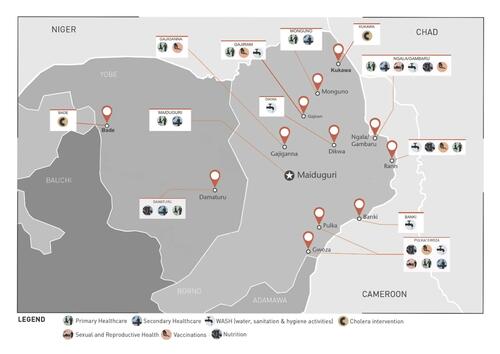
| Outpatient consultations | 25,490 |
| Inpatient admissions | 6,992 |
| Outpatient nutrition admissions | 785 |
| Inpatient nutrition admissions | 873 |
| Emergency room consultations | 7,398 |
| Vaccinations (including doses for PCV, measles and diphtheria) | 21,203 |
| Antenatal consultations | 5,624 |
| No. of medical screenings (in IDP camps) | 75,473 |
| Food distributions (in kg) | 41,885 |
| Non-food item (NFI) kits | 1,510 |
| Water trucked (in cubic litres) | 1,350 |
| Staff | 2,500+ |
Maiduguri
MSF runs a 100-bed inpatient therapeutic feeding centre (ITFC) in Fori, a southern district of Maiduguri. The centre, which opened in January 2017, treats between 95 and 150 severely malnourished children each month. Patients are treated for medical complications like tuberculosis, cerebral malaria, acute watery diarrhoea and respiratory tract infections. The facility also houses an eight-bed intensive care unit for children in need of close observation and monitoring. The centre is also a referral point for Severe Acute Malnutrition (SAM) cases across Maiduguri. From January to March 2018, 327 patients were admitted to the nutrition centre.
MSF also runs an outpatient feeding centre in Fori for cases of Moderate Acute Malnutrition (MAM), and Severe Acute Malnutrition (SAM) without complications. Between January and March 2018, 351 patients were admitted onto the programme.
In Gwange district, MSF continues to run an 84-bed facility providing secondary paediatric healthcare for residents of Maiduguri, as well as internally displaced persons (IDPs) from across the region. This facility also has an intensive care unit for children under 15 years old. MSF admitted 1,622 patients and provided 1,661 emergency room consultations between January and March 2018. With the onset of the rainy season, the capacity of the health facility can be expanded for patients with severe malaria and complications.
Monguno
Since the beginning of 2018, Monguno has seen an upsurge in the number of arrivals of IDPs from the surrounding areas and the islands on Lake Chad. According to International Organization for Migration (IOM) estimations in February 2018, 124,000 displaced people in Monguno, who have fled conflict across Borno, are unable to return to their homes. The IDPs in Monguno live in a number of camps.
MSF continues to operate a 54-bed facility for children under 15 years old. Between January and March 2018, MSF admitted 850 patients and provided 1,445 emergency room consultations in this facility.
Ngala
The town, which is situated near the border with Cameroon, was re-taken from armed groups by the Nigerian military in February 2015. Approximately 50,000 IDPs live in Ngala. The military oversees the security of the camp and a token-based system allows people to leave during the day. When MSF started working in Ngala in September 2016, we found an alarming situation where access to food, water, shelter and medical care was extremely limited. This situation has considerably improved and, since February 2017, MSF has had a permanent team in Ngala.
In Ngala, MSF runs a 54-bed inpatient department which includes maternity, delivery and neonatal care services. Teams also provide primary healthcare, blood bank services, nutritional care and outpatient consultations. From January to March 2018, MSF provided 459 inpatient and 9,439 outpatient consultations, 1,925 antenatal consultations and assisted 190 deliveries. Furthermore, 103 and 245 patients were enrolled in the inpatient and outpatient therapeutic feeding centres respectively.
Rann
After Rann was attacked by armed groups in 2015, the local population fled to other towns in Borno state and to neighbouring Cameroon. When Rann was re-captured by the Nigerian armed forces in March 2016, people started to return home. MSF was providing medical care in Rann in January 2017 when the town was bombed, killing 90 people and injuring a further 150 others. The Nigerian military later claimed responsibility for the bombing, saying it was a mistake. Three staff working for an organisation subcontracted by MSF were among the dead.
Following the Rann bombing, MSF provided medical care through mobile clinic teams who visited the town on a regular basis. Since September 2017, there has been a permanent MSF medical team in Rann. On 1 March 2018, MSF was forced to temporarily suspend activities following an attack on the military base. Three humanitarian aid workers from other organisations were killed in the attack and another three were abducted.
The humanitarian situation in Rann is worrying, particularly during the rainy season as the town gets cut off from the rest of the country. In the past few months, fires have claimed lives and injured several residents of Rann.
Between January and March 2018, MSF provided 3,955 outpatient consultations, 164 emergency room consultations, admitted five children to the inpatient therapeutic feeding centre and treated 84 patients in the outpatient therapeutic feeding centre.
Banki
Some people who fled the violence in Borno state now reside in a camp and in the main town in Banki. It under the control of the military and people are allowed to leave only to collect firewood in organised groups, supervised by the military. Most of the town’s original population fled in 2015 after it was taken by armed groups, with many crossing the border into Cameroon. The number of Nigerians returning from Cameroon, some by force, has risen over the past few months. In 2017, MSF handed over its medical activities to UNICEF. Teams continue to provide water and sanitation support for several days each month.
Damaturu
Damaturu is the capital of Yobe state, bordering Borno. Although it is relatively stable, armed groups are known to be active at least in the north and the south of the state. People in Damaturu have freedom to move and farm, and food is available in the markets.
Yobe is one of the poorest states in Nigeria. Healthcare structures in Yobe are very basic with access to medical care and health facilities limited.
In Damaturu hospital, MSF operates a 25-bed emergency paediatric unit, a 12-bed isolation ward and a 50-bed inpatient therapeutic feeding centre treating children under five years old with severe malnourishment and accompanying health complications. From January to March 2018, MSF admitted 677 patients to the inpatient department and enrolled 345 children onto the inpatient therapeutic feeding programme.
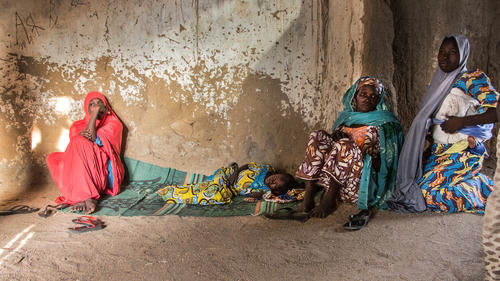
Gwoza
Gwoza is heavily controlled by the military. It is surrounded by mountains on one side, and the Sambisa forest on the other. Armed groups are believed to be active in both the forests and the mountains. The town often receives arrivals of displaced people from other areas and neighbouring Cameroon. For humanitarian actors, Gwoza is only accessible by helicopter, or by road with a military escort.
In Gwoza, MSF is running a 71-bed health facility. Teams continue to provide emergency medical services, nutritional and secondary inpatient care, sexual reproductive health services, mental health, care for victims of sexual and gender based violence (SGBV) and emergency surgeries. Figures from January to March 2018 include 1,928 inpatient admissions and 385 outpatient consultations, 1,702 antenatal and 2,343 emergency consultations, and 409 deliveries.
Pulka
According to IOM estimates for February 2018, Pulka hosts 40,278 IDPs in the camps and in the host community. The town is heavily controlled by the military. People are only allowed to move a short distance beyond the town’s perimeter to farm, but many do not feel safe leaving. Because of its proximity to the border with Cameroon, there is a regular influx of people.
Movement from Cameroon, organised by the Nigerian military, is ‘sometimes by choice and sometimes by force’. As a result of the unplanned and large-scale movement of people, there was a severe shortage of food, water and shelters in Pulka. The shortage of water resulted in a 45 per cent increase in cases of acute watery diarrhoea. New arrivals in Pulka are vaccinated and given food rations, non-food items like jerry cans and mosquito nets. Children undergo nutritional screenings.
MSF provides primary and secondary healthcare including outpatient care, emergency services, ante- and postnatal care and referral services. Teams also run mental health activities, community surveillance, and water and sanitation services for people living in the hospital grounds. From January to March 2018, MSF conducted 1,456 inpatient admissions, 10,808 outpatient consultations, 1,997 antenatal care consultations and 397 deliveries. Teams admitted 1,456 children to the inpatient therapeutic feeding centre and enrolled 105 patients to the ambulatory therapeutic feeding programme.
MSF also provided 3,530 vaccinations including for measles, diphtheria and pneumococcal disease (PCV), distributed 191 non-food kits and 12,045kg of food rations, and screened 69,171 people for malnutrition levels and signs of illnesses in the IDP camps. In order to reach new arrivals in the camps, MSF provided primary care at various transit points and camps, and provided 382 outpatient consultations.
Mobile clinics
Between January and March 2018, MSF provided 903 outpatient consultations and 14,657 vaccinations (including PCV and measles) in mobile clinics in Gajiganna and Gajiram – settlements along the Monguno – Maiduguri axis. In March 2018, 74 patients were admitted to MSF’s cholera treatment unit in Kukawa town, during an emergency intervention following an outbreak of cholera. To improve the water and sanitation infrastructure in parts of the state, 2,250 cubic metres of water was transported, 494 toilets were desludged (the process of removing sediments by draining and cleaning a tank) and repair works were undertaken.
Emergency response
In January 2018, MSF established a team to support emergencies with a focus on (but not restricted to) the northern states in Nigeria. The emergency team supported trauma centres set up in Adamawa to respond to the ongoing ethnic conflict between herders and farmers. The team also supported an emergency measles vaccination in Yobe, and responded to a Lassa fever outbreak by setting up an isolation ward and supporting eight health centres in Ondo state. In Bade LGA, the emergency team responded to a cholera outbreak treating more than 400 patients in the cholera treatment centre, and conducting a mass vaccination campaign targeting 125,000 people in the most affected districts in the state.




